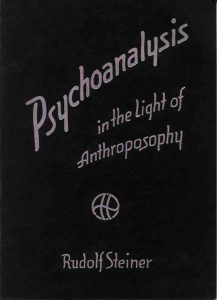Psychoanalysis in the Light of Anthroposophy
By Rudolf Steiner
Published by Anthroposophic Press, Inc., New York, and Rudolf Steiner Publications, Co., London in 1946. Translated by May Laird-Brown. Click to Buy this Book!
In these five lectures on psychoanalysis, Rudolf Steiner lays the foundations for a truly spiritual and holistic psychology.
The first two lectures, given at Dornach, Switzerland in November, 1912, are entitled Anthroposophy and Psychoanalysis, I & II. Here, Steiner gives a critical examination of the principles of Freud and Jung from the point of view of anthroposophy or spiritual science. Also mentioned are Breuer, Charcot, Nothnagel, Nietzsche, and Adler. Steiner argues that the phenomena animating psychoanalysis are real, but that because Freud did not recognize the spirit, human soul experience was cut off from the larger whole and reduced to mere subjective, personal history.
The last three lectures, given at Munich and Dornach in February, 1912 and July 1921, present an alternative program. Beginning (in Lecture III) with a phenomenological description of the threefold structure of human consciousness — reflective or mirror consciousness; supra-consciousness; and subconsciousness — Steiner goes on to outline a psychology that takes into account both the soul’s hidden powers (this is Lecture IV), and the complex connections between psychological and organic, bodily processes (in Lecture V). The third lecture in this series, Reflections in the Mirror of Consciousness, Superconsciousness and Subconsciousness, is available as another translation at the Rudolf Steiner Archive, Reflections of Consciousness, Super-consciousness and Sub-consciousness, published in 1935. Comparing the two translations can be rewarding!
Robert Sardello, Co-Director of the Dallas Institute For Humanities and Culture and a practicing psychotherapist, writes in his introduction to a later edition of this lecture series:
“These lectures on psychoanalysis and spiritual psychology, given by Rudolf Steiner in the years 1912, 1917, and 1921, at the very time when the ‘talking cure’ was in its beginnings, force us to confront the inadequate knowledge used in founding psychoanalysis and psychotherapy as a method of soul work… Anthroposophy leads to a wisdom of the soul … [It] not only takes us out of the limited domain of psychology as concerned with subjective states and into the broader realm of culture, it also takes us into an understanding of the body as the necessary organ through which spiritual perception must find its orientation.”
While this lecture series is a critical exegesis on one of the mainstays of psychology in the 20th century, it also presents a fresh look at the theory of psychoanalysis, as well as some alternatives … from an Anthroposophical perspective.
This excellent series of lectures can be read and studied on-line at: http://wn.rudolfsteinerelib.org/Lectures/Psych/English/AP1946/PsyAnt_index.html, or purchased from Amazon.com.
—
And now, a little bit about RUDOLF STEINER (1861-1925): Philosopher, scholar, scientist, and educator, he was the founder of Anthroposophy, a modern spiritual path or science. Out of his spiritual researches, he was able to provide indications for the renewal of many human activities, including education (the Waldorf Schools), agriculture (Biodynamics), medicine (Anthroposophical Medicine), special education (the Camphill Movement), economics, philosophy, and religion. In 1924, he founded the General Anthroposophical Society, which today has branches throughout the world.